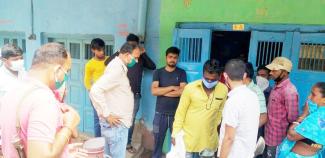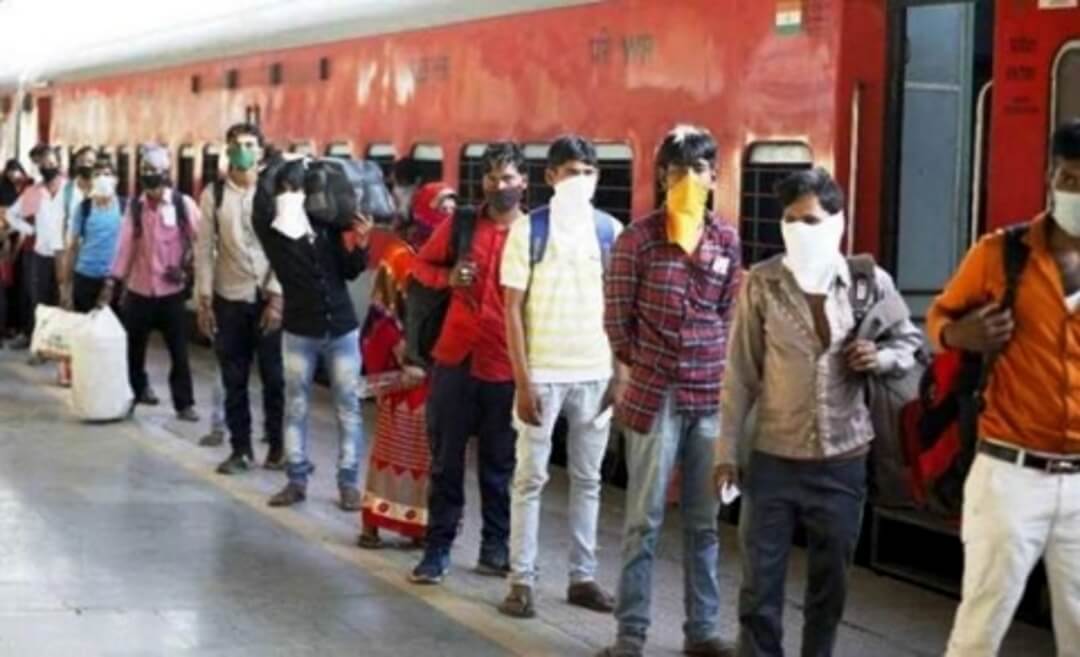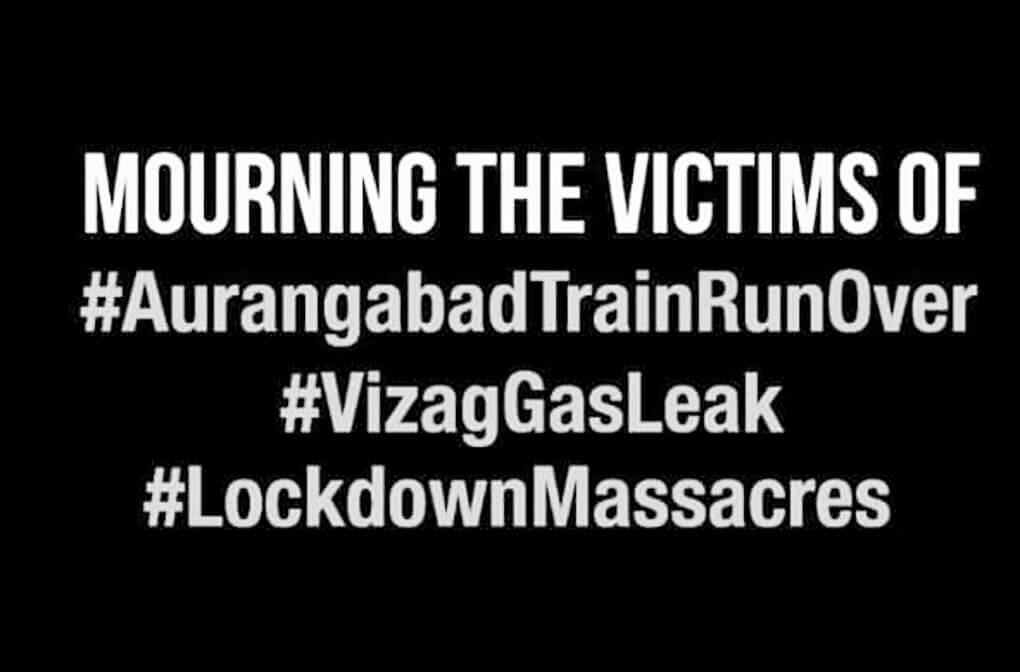
“WE were called today by phone. Having reached the station, they are now sending us back. They are saying that the train is full”. Soyna Munda is a worker in a construction company at Kanchipuram District of Tamil Nadu. His worry now is where he can go from here. “The company owner won’t allow us to go back in there, and we are not being allowed to stay here at the station either”.
Soyna is from Kuchai Block in Saraikela. He, along with 20 other workers, lives inside the construction company complex. These workers do the work of carrying concrete and other materials required for laying and pitching of roads. If they get work every day, their wages could be around Rs 9,000-10,000. After the Corona Lockdown they were allowed to live inside the company complex but they have to buy their own rations, and now they are faced with starvation.
According to a report dated 22 May 2020 in The Economic Times, more than 70% migrant workers still remain stranded despite 2050 Shramik Special trains being run. A large part of migrant workers from Jharkhand, Bengal, Odisha and other trains are still waiting in the expectation of trains to take them home. The Centre does not have any statistics on the total number of workers stranded due to the Lockdown. According to Rail Minister Piyush Goyal, 75% of the Shramik Special trains were for UP and Bihar. Instead of making adequate arrangements for trains and other transport for the return of workers, the Rail Minister took refuge in the politics of lies and said that the non-BJP ruled State governments were refusing to let the trains enter their States.
The first phase of the Lockdown made it clear that the Modi government had imposed it without prior planning or preparation. The 2011 Census, the 2016-17 Government of India economic survey and estimates based on it put the number of inter-state migrant workers in 2018 at about 7-11 crores. The annual growth rate of inter-state migrant workers is 4.5%. If this is added to the number of inter-state migrant workers, the number will become more than double (Financial Express—Sarit Kumar Raut). A major part of migrant workers consists of unorganized workers, gig workers and very small traders with very little capital. This is the socio-economically weakest section of society and daily wages or daily earnings are their means of livelihood. This is not merely a question of availability of statistics or studies. From the beginning of the first phase of Lockdown, news of lack of food and rations and reports of starvation were coming from everywhere. The government was nowhere to be seen in this hour of crisis. The CPIML MLA in Jharkhand Vinod Singh started getting distress phone calls every day 24x7. Most of these calls were for immediate relief and for return home. As the days progressed, migrant workers started getting less and less response from other officials, MPs and MLAs; and the CPIML MLA’s mobile number became the most-trusted helpline number for the migrant workers.
MLA and PB member Vinod Singh put consistent pressure on Chief Minister Hemant Soren to deposit an immediate assistance amount in the bank accounts of the migrant workers. He suggested that MLA Funds could be used for this. Initially the government wanted to limit the assistance amount to the MLA Funds alone. This would have enabled only a very small part of the workers to get assistance. After consistent pressure the government agreed to put Rs 1000 into every worker’s account, and there are reports that more than 2 lakh workers have received assistance. Compared to the huge crisis the workers are facing, this amount is very paltry. The monthly income of most of these workers is between 5,000 and 10,000. The Lockdown swallowed up 2 months’ income/wages. It is outrageous that the Modi government has till date no plans of giving them direct cash help. Far from anything special for them in Modi’s 20 lakh crore package, migrant workers have been pushed clean even out of the margins.
CPIML leader Ajit Patil says, “Initially we tried to help the workers ourselves, but after two or three days we realized how serious the matter was. No government had any preparation for handling this. Lack of rations was the biggest problem facing migrant workers. We asked the workers for a list of their employers. We put pressure on the employers and also contacted the concerned officials. Trade unions and Lal Nishan Party helped us a lot. We could help only about 10000-12000 workers, and there are lakhs more stranded workers in Mumbai”.
Sadrul from the Jharkhand Ekta Sangh in Mumbai and also associated with CPIML says, “We arranged rations for about 2,500 workers at our own cost. We contacted the authorities to solve their problems and also put the workers in contact with community kitchens. There was no one to take care of migrant workers. People from other sections could go to the doctor if they fell ill, but migrant workers had no access to medical treatment. Lack of rations and fear of Corona left them no option except to try and go home. But even going home was near-impossible due to the Lockdown”.
CPIML did not delay in understanding the situation and taking initiatives accordingly. At the central level the Party created a Whats-App group ‘Help Lockdown Affected’ through which the Party is reaching all corners of the country and trying to help stranded migrant workers through supporters and affiliated organizations.

“We sat on dharna for 5 days demanding trains. The police beat us with lathis. When the Karnataka government stopped trains from taking migrant workers home, Comrade Clifton went to court and the government had to revoke its order”, says Saddam Husain who is back from Mangalore in his village Harkund and is now in quarantine. His village Devri is in a remote area in Giridih, Jharkhand. Saddam used to work in a small hotel in Mangalore and used to earn about Rs 10,000 every month.
Comrade Clifton D’Rozario is a CC member of CPIML and the Karnataka State Secretary. Along with some civil society organizations and public minded individuals, he and CPIML comrades were always available to help migrant workers stranded in Karnataka. He says, “The people here have trusted us and so we are playing a leading role in helping stranded workers. Yesterday (22 May) I requested my lawyer friends to help stranded workers in Shimoga. They reached there in ten minutes and helped the workers. We have won another big victory for migrant workers. We had gone to court for free train travel for migrant workers. The Karnataka government said in court that they did not have the funds for this. Despite this, the court replied that it is the duty of the government to send penniless people home at their cost; and the government had to agree to this. Today (23 May) the Karnataka government has made all the trains starting from there free, all those who had paid for their travel today will be refunded”.
After the announcement of Lockdown.2, the workers lost hope and became desperate. Comrade Ajit Patil says that the government agencies were taking 15 to 20 days for rations to reach even those who were on the list of migrant workers eligible for rations. With barely one meagre meal a day, the workers had no option except to start walking home. 55 to 60 people would be crammed like animals in a single truck and they would have to pay Rs 5000-7000 for a ride from Mumbai to Jharkhand. Many workers had to ask for money to be sent from their homes for food or for their return home. Less than 10% of the total number of migrant workers from Jharkhand has come home by train so far.

On 8 May 20 workers were run over by a train at Aurangabad and 16 of them died. Exactly one week later on 16 May at 3 AM 24 migrant workers from Jharkhand, Bihar, Bengal and UP walking home from Rajasthan were killed in a horrific road accident. 11 of the workers killed were from Bokaro in Jharkhand. 31 workers walking to Garhwa from Andhra Pradesh were stopped Sukma in Chhattisgarh. Neither food nor transport was being arranged for them. There was hardly any road in Jharkhand through which an incessant stream of desperate workers was not walking home. News of accidents was coming in all the time. Despite this, the Modi government did nothing to help the workers.
Most of the workers who managed to return to their home States are at present in quarantine centers. But the Hemant Soren government has washed its hands of responsibility by ordering home quarantine. Many workers live in single room houses and home quarantine is tantamount to no quarantine. It is not difficult to understand how dangerous the consequences of this will be. Corona tests have made it clear that a large part of the returning workers could be infected. The number of positive cases in Garhwa, Hazaribagh, Bokaro, Santhal Parganas, Giridih, Singhbhum and other Districts is on the rise. Many State governments are arranging food, sanitizers, mosquito nets etc. at quarantine centers. The failure of the Jharkhand government to arrange quarantine centers and the neglect of migrant workers will have grave consequences.
“There are 7 members in my family and I am the sole earning member. How can we go outside to earn a living until everything becomes all right again? And if I don’t go out to work, how shall I support my family?” Arun Ram is very worried. He is from Paalmo in Jamua, Giridih (Jharkhand). He used to work in a go-down in Delhi at Rs 8000 per month. He did not get the salary for April, and his March salary got spent for food and his return home.
Pokhan Singh from Lukaiya in Bagodar (Jharkhand) is a sand worker in Mumbai, earning 7000-8000 per month. “The ‘Seth’ (employer) was asking me to remain there and work but without salary. Here also in the school (quarantine center) food is coming from home. But how long can food come from home? When I get out of here we can’t manage unless I find some work”.
Like the Corona pandemic, the fear of unemployment is getting deeper and deeper. Migrant workers usually send almost their entire income home and do some extra work to somehow manage their own needs in their State of migration. Income from migrant workers is an important part of Jharkhand’s rural economy. The Lockdown will shatter the entire rural economy. The announcements made so far by governments have not addressed this issue. 25 year old Churaman Turi says, “We are capable of doing all kinds of work. We’ll have to find work here itself. Will the government not give us employment?”
That is the biggest question today. The answer to this question is not to be seen in government announcements. The answer is to be found somewhere in the struggles emerging in rural areas for rations, health and shelter.
Giridih’s Prosperity was due to Migrant Workers’ Income: Vinod Singh
(Excerpts from an interview with Jharkhand MLA and CPIML Politburo member Vinod Singh.)
Q: From the beginning of the Lockdown to the present fourth phase of Lockdown, where do migrant workers stand today?
Vinod Singh: All migrant workers haven’t yet been able to return home. Those who have returned are living in appalling conditions in schools or tents, because there are no government arrangements for quarantine.
Q: Just 2 or 3 days after the Lockdown was announced, migrant workers started facing lack of rations. To what extent were the steps taken by the government for this adequate? What was your (and your Party’s) role in this?
VS: Daily wage earners were especially distressed from the early days of the Lockdown. The concerned States did not make good arrangements. From the beginning our Party put pressure on the government for DBT (Direct Benefit Transfer). But the government delayed it too long and even then gave only Rs 1000; and the mode was also quite technical, so only about 2 lakh workers from Jharkhand could receive the money in their accounts. After getting information from us our Party comrades, with help and cooperation from some NGOs and individuals, helped the workers. In many villages where the Party has a strong base our comrades and friends collected money and sent it to needy workers.
Q: Many migrant workers have become infected by COVID. Please comment on their check-up and medical treatment.
VS: The positive cases among migrant workers who have returned to Jharkhand are on the rise. Testing is very limited as of now. Only those who have come in direct contact are being tested. The test reports also take a long time to come; as long as a week.
Q: What are the immediate problems faced by migrant workers who have returned and their families?
VS: The problem of employment is a huge one. Rural disputes have increased. The sparkle, the prosperity of Jharkhand, especially Giridih, was due to the income that came from migrant workers. The market was also connected to this. This has been badly shattered.
Liberation Archive
- 2001-2010
-
2011-2020
- 2011
- 2012
- 2013
- 2014
- 2015
- 2016
- 2017
- 2018
- 2019
-
2020
- Liberation, JANUARY 2020
- Liberation, FEBRUARY 2020
- Liberation, MARCH 2020
- Liberation, APRIL 2020
-
Liberation, MAY-JUNE 2020
- Stand With the Cyclone Ravaged Areas and People : Donate Generously to Relief Efforts
- The Lockdown Has Unlocked India's Suppressed Social Reality of Migrant Workers
- Modi's Covid19 Stimulus Package: Monumentally Deceptive and Disastrous
- Enslaving India's Workers and Renting Out India To Global Capital Is Not the Way to Self Reliance
- Dealing with the Lockdown: Precious Lessons from the Unique Experience of an Unprecedented Phase
- Remembering Ambedkar amidst the Covid19 Pandemic and Lockdown
- May Day 2020 : International Day of Workers in Times of Global Pandemic
- The 202nd Birth Anniversary of Karl Marx
- Experiences of Relief Work in Bihar: Government Abdicates, People take Initiative
- Lockdown Emboldens Feudal, Communal and Criminal Forces
- The Girl on a Bicycle
- Will the Government Not Give Us Jobs?
- Migrant Workers of Jharkhand Stranded in Maharashtra During Lockdown
- Lockdown Relief Reports from Uttar Pradesh
- The Varanasi Mohalla Kitchen Experience
- CPIML Activities in Kerala during the Lockdown
- Initiatives in Tamil Nadu During Lockdown
- Covid 19 Lockdown Relief Work in Chandigarh
- Thousands of Distressed Workers in Jaipur Come Out on the Streets
- Relief Work During Lockdown in Delhi
- Invisible but Irreplaceable? Migrant Labour BC 2019 and AC 2020
- Karnataka : Notes on Migrant Workers Assistance Campaign
- The Pandemic and Beyond : Free Quality Healthcare is a Fundamental Right
- Epidemic Act 1897 : A Draconian Colonial Hangover
- Kerala Model Delivers in Covid -19 Control
- A Note on Herd Immunity
- Modi Regime's War on Working Class
- Attacks on Students and Public Education
- The Pandemic's India Journey: Short Takes
- Open Letter to British Labour Party Leader: Don't Align the Labour Party with Allies of Modi's Far-Right Regime
- Facilitating the Corporate Plunder of Kashmir Under Cover of Covid19
- Hunger Strike by CPIML Leader BN Singh Incarcerated in Medini Nagar, Jharkhand
- Hari Vasudevan
- Tribute : Comrade Narender Kumar & Comrade Suhail Akhtar
- Liberation, JULY 2020
- Liberation, AUGUST 2020
- Liberation, SEPTEMBER 2020
- Liberation, OCTOBER 2020
- Liberation, NOVEMBER 2020
- Liberation, DECEMBER 2020
- 2021-2030
Charu Bhawan, U-90, Shakarpur, Delhi 110092
Phone: +91-11-42785864 | Fax:+91-11-42785864 | +91 9717274961
E-mail: info@cpiml.org







